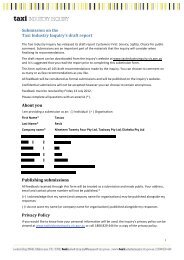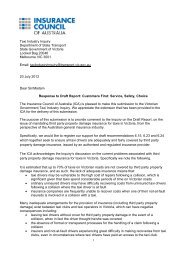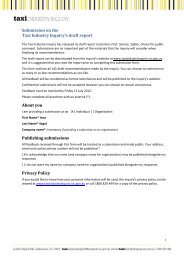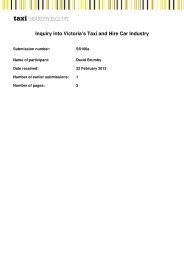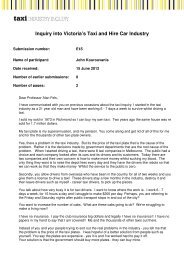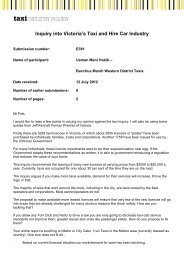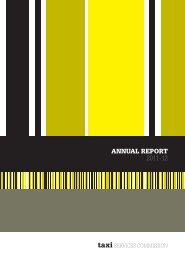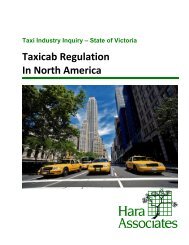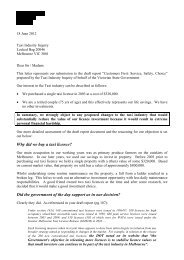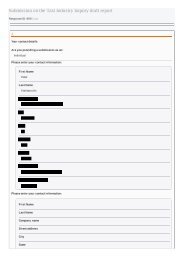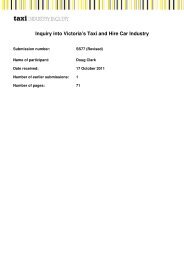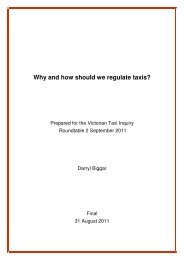Part D â Understanding and improving industry performance (PDF ...
Part D â Understanding and improving industry performance (PDF ...
Part D â Understanding and improving industry performance (PDF ...
Create successful ePaper yourself
Turn your PDF publications into a flip-book with our unique Google optimized e-Paper software.
This also means that other NSPs <strong>and</strong> operators will<br />
be concerned about installing equipment that cannot<br />
process Cabcharge-br<strong>and</strong>ed cards. Regular taxi users,<br />
<strong>and</strong> particularly corporate users, who tend to be higher<br />
users of Cabcharge cards likely have an expectation that<br />
these cards will be accepted. If alternative equipment is<br />
installed that does not process Cabcharge cards, there<br />
is a strong possibility of user dissatisfaction <strong>and</strong> ultimate<br />
loss of taxi users.<br />
The inquiry is concerned primarily about the effectiveness<br />
of competition in markets for payments processing <strong>and</strong><br />
payment instruments. Over time, it appears to the inquiry<br />
that Cabcharge has been extremely effective in stifling<br />
the development of competition in these markets. The<br />
merger approval process is clearly not preventing these<br />
competition issues from emerging.<br />
Future issues likely to emerge<br />
A key issue for the inquiry is how future mergers <strong>and</strong><br />
acquisitions might be treated by the ACCC, particularly if<br />
certain changes are recommended.<br />
The inquiry notes that further consolidation of NSPs in<br />
metropolitan Melbourne is unlikely, as a duopoly already<br />
exists. Further consolidation will almost certainly reduce<br />
competition. In addition, even if the current structure<br />
stayed the same there will be little opportunity for future<br />
vertical mergers to lessen competition, as Cabcharge<br />
now has a very strong market presence across payment<br />
instruments, payments processing, taxi equipment supply<br />
<strong>and</strong> network services.<br />
However, the inquiry is concerned about the potential<br />
effect of the ACCC’s recent merger approach if<br />
significant changes in zoning result from the inquiry’s<br />
recommendations.<br />
11.7.2. Barriers to entry<br />
In order to be sustainable, a new network must establish<br />
its business concurrently on both sides of the two-sided<br />
market. Acquiring enough operators to meet customer<br />
dem<strong>and</strong> is further complicated by any restriction on<br />
licence numbers since this means that new NSPs have to<br />
attract taxi operators away from existing NSPs.<br />
Two critical <strong>and</strong> competing elements are present that<br />
further act as barriers to the creation of a successful<br />
new network. The first element is the need to establish<br />
goodwill <strong>and</strong> br<strong>and</strong> underst<strong>and</strong>ing with consumers,<br />
encouraging them to change their behaviour <strong>and</strong> move<br />
away from more established br<strong>and</strong>s. The second element<br />
is that operators need to be assured of a sufficient<br />
supply of revenue derived from booked work from the<br />
new network to meet their own high operating costs <strong>and</strong><br />
retain bailee drivers. These two factors compete in that<br />
a new network may find it difficult to offer acceptable<br />
wait times to customers without an adequate number of<br />
taxis in the fleet, while operators will be reluctant to join a<br />
network that cannot provide them with sufficient work to<br />
make a profit.<br />
As mentioned above, the current limited supply of taxi<br />
licences results in new entrants needing to encourage<br />
existing taxi operators to break their affiliation with the<br />
established providers <strong>and</strong> move to the new network.<br />
Due to the high number of ancillary services currently<br />
provided by the existing NSPs, operators will likely<br />
incur a high level of costs in switching their affiliation,<br />
including equipment removal <strong>and</strong> re-installation (for<br />
payment terminals, dispatcher technology <strong>and</strong> cameras),<br />
refinancing of vehicles <strong>and</strong> licences, a risk of losing<br />
assignments, <strong>and</strong> the loss of supply of network trained<br />
drivers. The inquiry underst<strong>and</strong>s that there are few<br />
instances of operators switching networks.<br />
Where these costs are borne by the operator, they act<br />
as a very effective deterrent to switching. Alternatively,<br />
if these costs are subsidised by the new network as an<br />
incentive for operators to switch affiliation, this will result<br />
in significantly higher set-up costs for the new NSP.<br />
The one new entrant into the Melbourne market in recent<br />
years is Platinum Taxis. Platinum Taxis has experienced<br />
only marginal growth over its first four years <strong>and</strong> continues<br />
to offer its services to taxi operators at a significantly<br />
reduced rate than that of the two major metropolitan<br />
networks. Platinum Taxis have focused their consumer<br />
offerings predominantly at ‘high end’ service in long<br />
wheelbase vehicles having originally emerging from a well<br />
established secondary network. Despite reduced affiliation<br />
fees (see Figure 11.6), Platinum Taxis has not experienced<br />
material growth within the Melbourne NSP market.<br />
Most operators that are affiliated with Platinum Taxis are<br />
also known to continue to source work through their<br />
association to secondary networks <strong>and</strong> through private<br />
clients of the operator <strong>and</strong>/or driver. This reduces their<br />
reliance on booked work from the primary network.<br />
As long as licensing numbers are subject to quantitative<br />
restriction it will be difficult to overcome the barriers to<br />
entry for new NSPs. In this context there is a stronger<br />
case for removing the m<strong>and</strong>atory affiliation requirement.<br />
In an open market there will be more opportunities to<br />
establish new NSPs.<br />
<strong>Underst<strong>and</strong>ing</strong> <strong>industry</strong> <strong>performance</strong> CUSTOMERS FIRST 243



